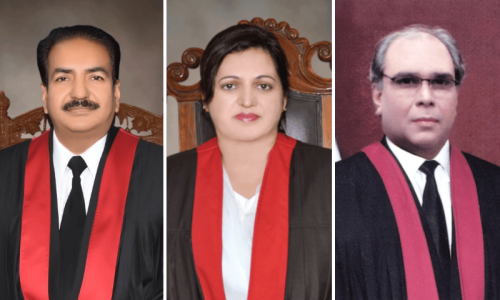ISLAMABAD: The National Disaster Management Commission (NDMC) – a body headed by the prime minister and consisting of key government officials – which is supposed to come up with a unified national disaster response plan, has not met since 2012.
In addition, a 10-year plan formulated at the last NDMC meeting aimed at improving the country’s capacity to cope with future disasters in the wake of the 2010-2011 floods, has yet to be ratified because the body has not met since, sources have told Dawn.
According to a senior disaster management official in Islamabad, the NDMC is chaired by the prime minister himself and is supposed to be attended by all four chief ministers and governors, opposition leaders from the Senate and the National Assembly, the chairman joint chiefs of staff committee as well as representatives of key government departments, such as the railways, motorway authority and other related departments.
Know more: Is Pakistan ready for a monsoon catastrophe
This forum is the platform where all key decision-makers gather and decide disaster management policies. The minutes of the last meeting held in February 2012, sources say, contain the draft of a $1 billion, four-volume plan that looks to address the country’s disaster-preparedness needs over the next decade.
l PM-headed disaster management body hasn’t met since February 2012 l $1bn, 10-year plan to cope with future floods still lies unapproved l Despite legislation, district-level disaster management bodies inoperative l NDMA official says Met Office got it wrong, predicted no heavy rains in August
Officials privy to the plan’s details said that certain official concerns were raised regarding the minutes of the last meeting and, consequently, had to be approved by the body before being circulated.
But since the body has not met again for two years, sources say the plan has not been approved.
However, an official from the National Disaster Management Authority (NDMA) insists that certain aspects of the plan were being implemented, despite the lack of official approval.
Sarwar Bari of the Pattan Development Organisation also echoes concerns about the non-functionality of the NDMC.
“Meetings of NDMC and provincial disaster management committees should be held without further delay,” he told Dawn.
NDMA spokesperson Ahmed Kamal told Dawn that following the passage of the National Disaster Management Act in December 2012, the government was mandated to form national, provincial and district-level disaster management authorities. Although the NDMA and the various provincial disaster management authorities (PDMAs) do exist – in compliance with the law - district-level disaster management authorities (DDMAs) have yet to be constituted in all districts.
The spokesperson also said the NDMC meeting could only be called by the prime minister himself. He said that instead, NDMA had held several meetings over the past few weeks. He insists that the government did all it could to prepare for the floods.
Political interference was said to be one of the primary reasons why the floods of 2010 caused such widespread havoc in parts of Sindh and Balochistan.
It was alleged at the time that certain politicians countermanded the competent officials and had the floodwaters diverted away from their land. This, Mr Bari says, can only be dealt with at the district level.
However, Mr Kamal told Dawn that while “all the relevant authorities have been formed, district disaster management authorities had not been activated as yet because they are being run without permanent heads and staff”.
“On June 30 and July 1, monsoon preparedness conferences were held in Islamabad where issues regarding possible floods were discussed. On August 6, the Meteorological Department issued a report saying that July had seen rainfall 30 per cent below the average and said that it expected this trend to continue in August,” he said, suggesting that the heavy rains were unforeseen and could not have been guarded against.
But senior official from a provincial disaster management authority rubbishes the spokesperson’s claim.
The official, who was involved in the response to the floods of 2010 and 2011, says it is true that weather patterns cannot be accurately predicted beyond a week and that long-term projections are seldom accurate.
“The Met Office predicted that there will be normal rains in upper Punjab and below normal rain in south and central Punjab, Sindh and Balochistan. But their prediction turned out to be off the mark,” he said.
The world over, countries make plans to deal with challenges over the next 10 to 50 years in order to minimize the fallout from unforeseen natural disasters, he said. But in Pakistan, where flooding was a regular phenomenon, no concrete measures were taken to properly prepare for the coming rains.
“The country has a history of flooding. Severe floods have been observed in the years 1952, 1976, 1992, 2007, 2010, 2011 and 2014. In 2010 there was more water in the River Indus, but as of September 10 this year, flows in the Indus remained low and the floodwaters surged through the Chenab, Ravi and Jhelum,” he said.
The official told Dawn that the Sindh floods of 2011 were caused by heavy rains and choked drainage systems that had not been properly rehabilitated following the widespread destruction the year before. “Punjab was not affected in 2011,” he said.
“Even though the government makes a National Flood Protection Plan every year, its recommendations amount to asking the army for assistance and deciding which dykes to breach,” he said.
The official stressed that both short-term measures and long-term efforts needed to be carried out simultaneously in order to guard against future calamities.
Published in Dawn, September 12th, 2014














































